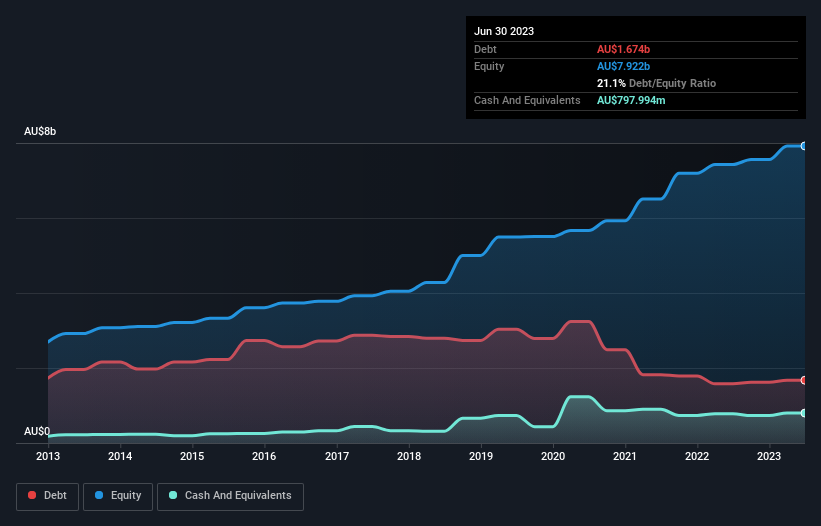- Australia
- /
- Healthcare Services
- /
- ASX:SHL
Here's Why Sonic Healthcare (ASX:SHL) Can Manage Its Debt Responsibly

Some say volatility, rather than debt, is the best way to think about risk as an investor, but Warren Buffett famously said that 'Volatility is far from synonymous with risk.' So it might be obvious that you need to consider debt, when you think about how risky any given stock is, because too much debt can sink a company. As with many other companies Sonic Healthcare Limited (ASX:SHL) makes use of debt. But the more important question is: how much risk is that debt creating?
When Is Debt Dangerous?
Debt assists a business until the business has trouble paying it off, either with new capital or with free cash flow. Ultimately, if the company can't fulfill its legal obligations to repay debt, shareholders could walk away with nothing. However, a more usual (but still expensive) situation is where a company must dilute shareholders at a cheap share price simply to get debt under control. Having said that, the most common situation is where a company manages its debt reasonably well - and to its own advantage. The first thing to do when considering how much debt a business uses is to look at its cash and debt together.
See our latest analysis for Sonic Healthcare
What Is Sonic Healthcare's Net Debt?
The image below, which you can click on for greater detail, shows that at June 2023 Sonic Healthcare had debt of AU$1.67b, up from AU$1.58b in one year. However, because it has a cash reserve of AU$798.0m, its net debt is less, at about AU$875.9m.

How Healthy Is Sonic Healthcare's Balance Sheet?
We can see from the most recent balance sheet that Sonic Healthcare had liabilities of AU$1.88b falling due within a year, and liabilities of AU$3.21b due beyond that. On the other hand, it had cash of AU$798.0m and AU$1.02b worth of receivables due within a year. So its liabilities total AU$3.27b more than the combination of its cash and short-term receivables.
Sonic Healthcare has a market capitalization of AU$13.7b, so it could very likely raise cash to ameliorate its balance sheet, if the need arose. But we definitely want to keep our eyes open to indications that its debt is bringing too much risk.
We measure a company's debt load relative to its earnings power by looking at its net debt divided by its earnings before interest, tax, depreciation, and amortization (EBITDA) and by calculating how easily its earnings before interest and tax (EBIT) cover its interest expense (interest cover). This way, we consider both the absolute quantum of the debt, as well as the interest rates paid on it.
Sonic Healthcare's net debt is only 0.68 times its EBITDA. And its EBIT covers its interest expense a whopping 11.7 times over. So you could argue it is no more threatened by its debt than an elephant is by a mouse. In fact Sonic Healthcare's saving grace is its low debt levels, because its EBIT has tanked 53% in the last twelve months. When it comes to paying off debt, falling earnings are no more useful than sugary sodas are for your health. There's no doubt that we learn most about debt from the balance sheet. But it is future earnings, more than anything, that will determine Sonic Healthcare's ability to maintain a healthy balance sheet going forward. So if you're focused on the future you can check out this free report showing analyst profit forecasts.
Finally, while the tax-man may adore accounting profits, lenders only accept cold hard cash. So the logical step is to look at the proportion of that EBIT that is matched by actual free cash flow. During the last three years, Sonic Healthcare generated free cash flow amounting to a very robust 88% of its EBIT, more than we'd expect. That positions it well to pay down debt if desirable to do so.
Our View
Sonic Healthcare's conversion of EBIT to free cash flow suggests it can handle its debt as easily as Cristiano Ronaldo could score a goal against an under 14's goalkeeper. But we must concede we find its EBIT growth rate has the opposite effect. It's also worth noting that Sonic Healthcare is in the Healthcare industry, which is often considered to be quite defensive. Looking at all the aforementioned factors together, it strikes us that Sonic Healthcare can handle its debt fairly comfortably. On the plus side, this leverage can boost shareholder returns, but the potential downside is more risk of loss, so it's worth monitoring the balance sheet. The balance sheet is clearly the area to focus on when you are analysing debt. But ultimately, every company can contain risks that exist outside of the balance sheet. These risks can be hard to spot. Every company has them, and we've spotted 2 warning signs for Sonic Healthcare you should know about.
When all is said and done, sometimes its easier to focus on companies that don't even need debt. Readers can access a list of growth stocks with zero net debt 100% free, right now.
If you're looking to trade Sonic Healthcare, open an account with the lowest-cost platform trusted by professionals, Interactive Brokers.
With clients in over 200 countries and territories, and access to 160 markets, IBKR lets you trade stocks, options, futures, forex, bonds and funds from a single integrated account.
Enjoy no hidden fees, no account minimums, and FX conversion rates as low as 0.03%, far better than what most brokers offer.
Sponsored ContentNew: Manage All Your Stock Portfolios in One Place
We've created the ultimate portfolio companion for stock investors, and it's free.
• Connect an unlimited number of Portfolios and see your total in one currency
• Be alerted to new Warning Signs or Risks via email or mobile
• Track the Fair Value of your stocks
Have feedback on this article? Concerned about the content? Get in touch with us directly. Alternatively, email editorial-team (at) simplywallst.com.
This article by Simply Wall St is general in nature. We provide commentary based on historical data and analyst forecasts only using an unbiased methodology and our articles are not intended to be financial advice. It does not constitute a recommendation to buy or sell any stock, and does not take account of your objectives, or your financial situation. We aim to bring you long-term focused analysis driven by fundamental data. Note that our analysis may not factor in the latest price-sensitive company announcements or qualitative material. Simply Wall St has no position in any stocks mentioned.
About ASX:SHL
Sonic Healthcare
Offers medical diagnostic and administrative services to medical practitioners, hospitals, community health services, and patients in Australia, the United States, Germany, and internationally.
Excellent balance sheet average dividend payer.
Similar Companies
Market Insights
Community Narratives



